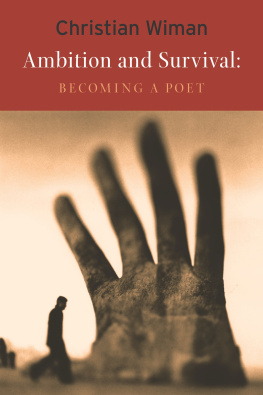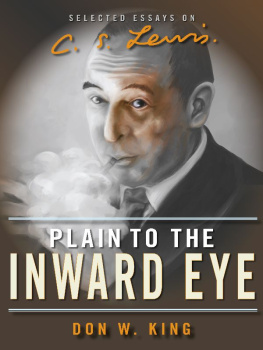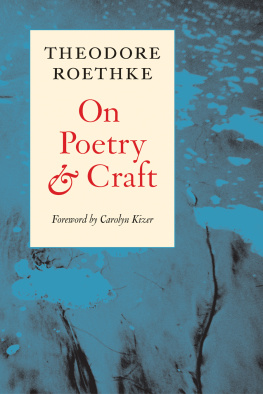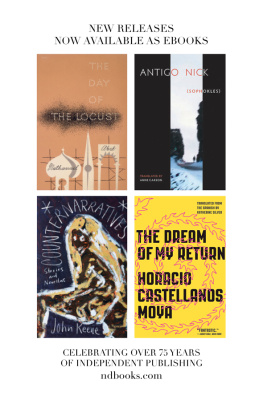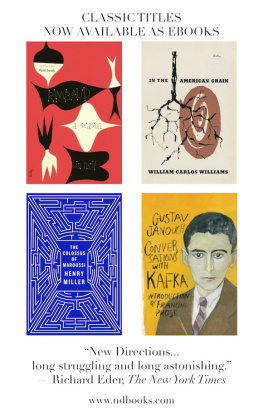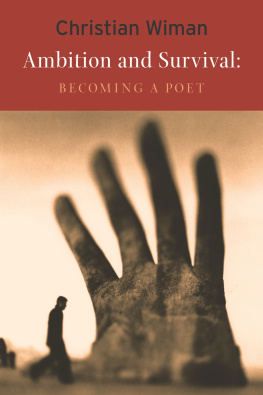Wiman - Ambition and survival : becoming a poet
Here you can read online Wiman - Ambition and survival : becoming a poet full text of the book (entire story) in english for free. Download pdf and epub, get meaning, cover and reviews about this ebook. City: Port Townsend, Wash, year: 2007, publisher: Copper Canyon Press, genre: Art. Description of the work, (preface) as well as reviews are available. Best literature library LitArk.com created for fans of good reading and offers a wide selection of genres:
Romance novel
Science fiction
Adventure
Detective
Science
History
Home and family
Prose
Art
Politics
Computer
Non-fiction
Religion
Business
Children
Humor
Choose a favorite category and find really read worthwhile books. Enjoy immersion in the world of imagination, feel the emotions of the characters or learn something new for yourself, make an fascinating discovery.
Ambition and survival : becoming a poet: summary, description and annotation
We offer to read an annotation, description, summary or preface (depends on what the author of the book "Ambition and survival : becoming a poet" wrote himself). If you haven't found the necessary information about the book — write in the comments, we will try to find it.
Ambition and Survival is a collection of stirring personal essays and critical prose on a wide range of subjects: reading Milton in Guatemala, recalling violent episodes of his youth, and traveling in Africa with his eccentric father, as well as a series of penetrating essays on writers as diverse as Thomas Hardy and Janet Lewis. The book concludes with a portrait of Wimans diagnosis of a rare form of incurable and lethal cancer, and how mortality reignited his religious passions.
When I was twenty years old I set out to be a poet. That sounds like I was a sort of frigate raising anchor, and in a way I guess I was, though susceptible to the lightest of winds. . . . When I read Samuel Johnsons comment that any young man could compensate for his poor education by reading five hours a day for five years, thats exactly what I tried to do, practically setting a timer every afternoon to let me know when the little egg of my brain was boiled. Its a small miracle that I didnt take to wearing a cape.
Praise for Ambition and Survival
That calling, at once religious, ethical, and aesthetic, is one that only a genuine poet can hearand very few poets can explain it as compellingly as Mr. Wiman does. That gift is what makes Ambition and Survival, not just one of the best books of poetry criticism in a generation, but a spiritual memoir of the first order.
New York Sun
This weighty first prose collection should inspire wide attention, partly because of Wimans current job, partly because of his astute insights and partly because he mixes poetry criticism with sometimes shocking memoir...The collections greatest strength comes in general ruminations on the writing, reading and judging poetry. Publishers Weekly
[Wiman is] a terrific personal essayist, as this new collection illustrates, with the command and instincts of the popular memoirist ... This is a brave and bracing book. Booklist
Christian Wimans poems often spoke of a void, and then they stopped. In Ambition and Survival,Poetry magazines editor rediscovers his spirituality and his voice.Chicago Sun-TimesChristian Wiman is the editor of Poetry magazine. His poems and essays appear regularly in The New Yorker, The Atlantic Monthly, Harpers, and The New York Times Book Review. He is the author of several books of poetry, including The Long Home (isbn 9781556592690) and Hard Night (isbn 9781556592201).Wiman: author's other books
Who wrote Ambition and survival : becoming a poet? Find out the surname, the name of the author of the book and a list of all author's works by series.

